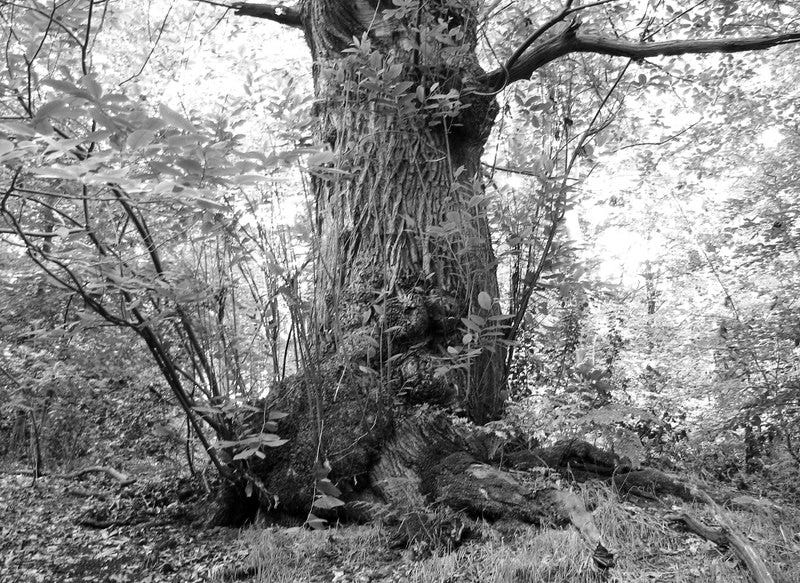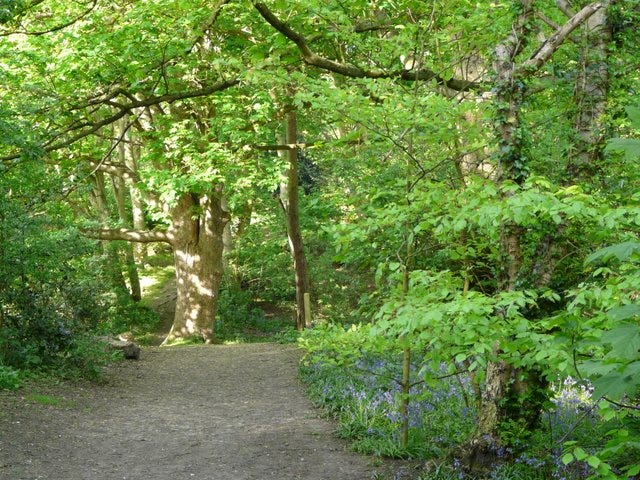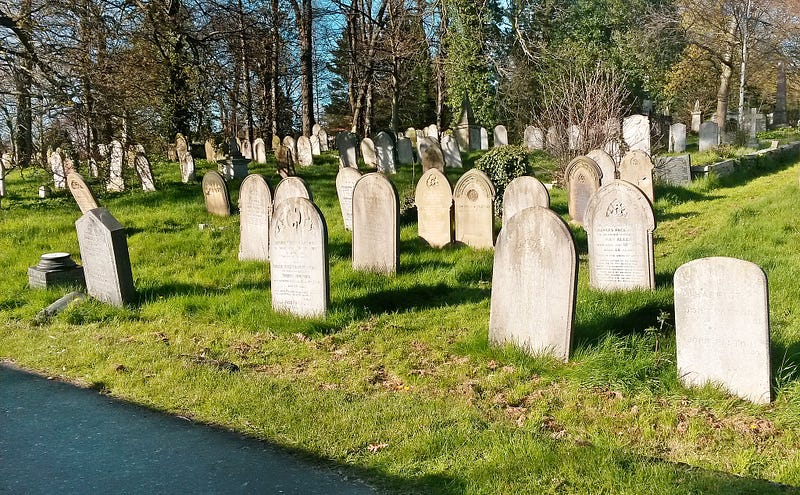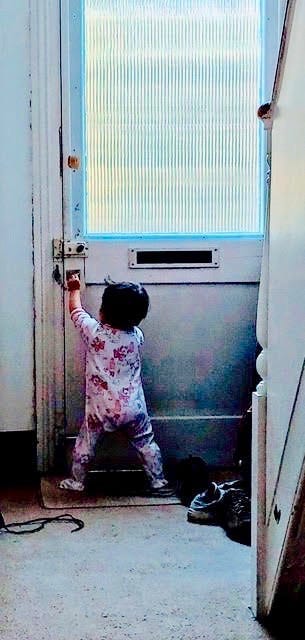Walking a baby through a British wood and a pandemic.
“It was a long, windy, and wet winter like all British winters, which are best described by inhabitants as ‘utter shit.’ These winters inspire people to emerge from their homes and risk the pandemic to feel this shock of spring sun.”

A mature sweet chestnut tree in Lion Wood. Copyright Evelyn Simak and licensed for reuse.
We stayed inside until the sun broke through the clouds and the windows and heated the sides of our black coffee cups. We didn’t feel like staying in any longer, so we went to Lion Wood, where it was cool. We did not go for the exercise. We did not go to bask in nature. We went to get away from ourselves, and the way to do that is to strap our eleven-month-old up in a baby carrier, walk up the one hill in Norwich, up the road with the shoulder-to-shoulder terrace houses, to where two paths meet the road. To the right, opens into a Victorian cemetery made for different pandemics. Weather-beaten, lichen-bitten stones mark those who never left quarantine. To the left, burrows into the nature reserve, where the squirrels bark and the small birds chirp and the path dips into a brown-green place of towering trees grown from the bones of the fallen. This is Lion Wood.
Lion Wood is like any wood: dark, except where old rotted trees have fallen and cleared space in the canopy for the thorns below to carpet. Some of the trails chop into thorny walls of holly. Our eleven-month-old coos when we go into these caves and I figure that means “Cool.” Staking through the middle of the reserve is a dale where most walk their dogs, walk their kids, cut from one outpost of homes to another, jog, talk on the phone, eye one another to keep distant, and try their best to say, “Good morning,” while they’re taking their only exercise of the day. This is their brief moment of spring air.

It was a long, windy, and wet winter like all British winters, which are best described by inhabitants as “utter shit.” These winters inspire people to emerge from their homes and risk the pandemic to feel this shock of spring sun. It’s these “utter shit” winters that I suspect fostered dreams of empire, chiefly where the weather was better. Or maybe it was the Victorian-era cocaine. Or the plagues that filled large Victorian graveyards like the one back at the road.
This long and wide dale with its foot- and paw- and bike-tire-beaten paths reorients you to the scale of what’s happening: Social distancing even softens the “Good mornings,” and hardens glares that ask, Are you going to get me sick?
Our eleven-month-old waves at them, says “Bah!” Which is as close to bye as this eleven-month-old can make. People remember to smile. I remember why I’m supposed to stay isolated: for the vulnerable.
There’s another rise with trails splitting to different neighborhoods. Almost always there’s a glove, a hat, an umbrella left on one of the three benches. These items wait for their owners. They’re left unmolested now because of what they may carry. The trails on this hill are thinner. They expose the glassy flint that makes the bones of these hills.
And there’s another hill, but this one is starker, its stairs rising out of a mud pit flanked by a lightning-struck oak. The oak is scorched to its core.
We keep walking through caves of holly. Leaves and twigs crunching below, distant dogs barking, birds scattering and chattering.
And then, just past the moment when you forget life stuck in a house, the bushes and oaks and thorns and pine needles stop at a fence. There is a park of mowed green fields. Daffodils mark one end. The basketball court and the playground are chained and padlocked. Only crows play on the soccer field. This is what I think I’ll forever remember: the empty parks. No kids playing. No elderly watching. Nobody out.
We put our eleven-month-old in the grass. Baby crawls. Baby picks at the grass. We watch for bees. Then, when we think that we look suspicious to a passing police car and that we’re risking too much being here, outside, we strap up, dive back into the caves and to the road, past the cemetery, down the hill to the house, where we’ll pace rooms wanting to do something. We worry. We wait for the voices on the news to say it’s okay now to walk the streets.
For now, all they say is that to leave your house is potentially to kill someone.
Our eleven-month-old bangs on the door to go outside and brings us the baby carrier. Baby waves at people, dogs, or birds that pass outside our window. No one sees baby. No one ever waves back.

*****************************************************************

Joe Milan, Jr., is the 2019–20 David T.K. Wong Creative Writing Fellow at the University of East Anglia and the Barrick Graduate Fellow at the University of Nevada Las Vegas. Wonderful places like The Rumpus, Broad Street, F(r)iction (2017 Short Story winner selected by Celeste Ng), The LA Review of Books, The Kyoto Journal, and others have published his work. You can read more of his work at joemilanjr.com. His previous piece for Broad Street, “I Got Grown,” was one of our Pushcart nominees for 2019.
This feature is also available, in slightly different format, on Medium.

The toddler in question.








